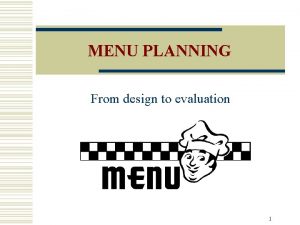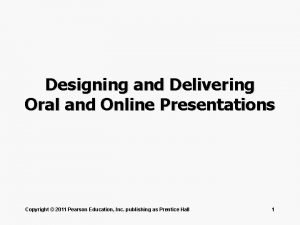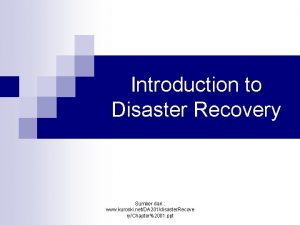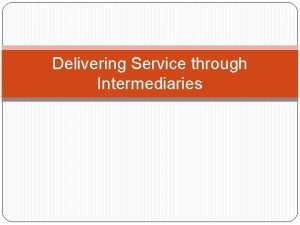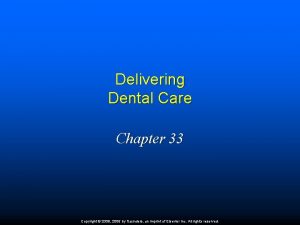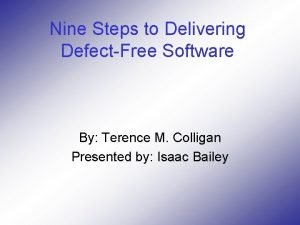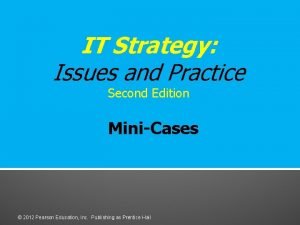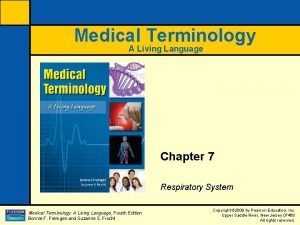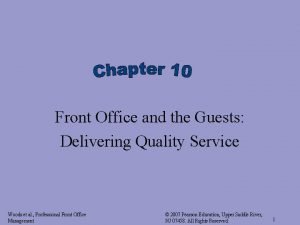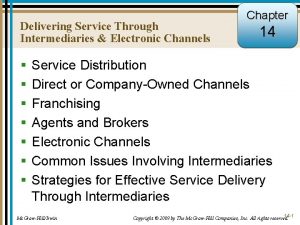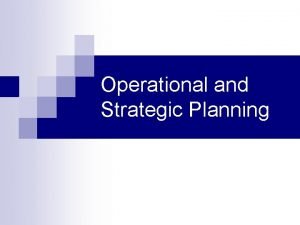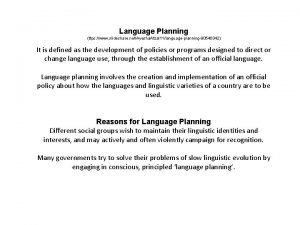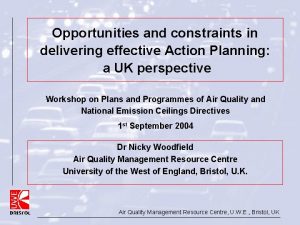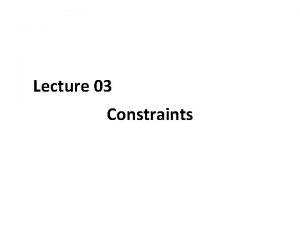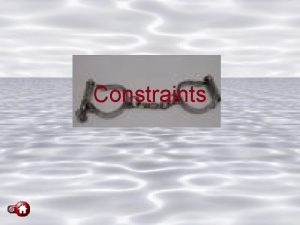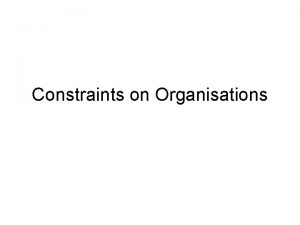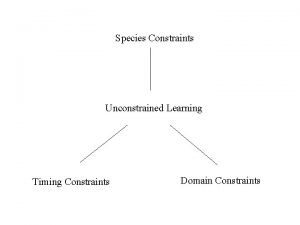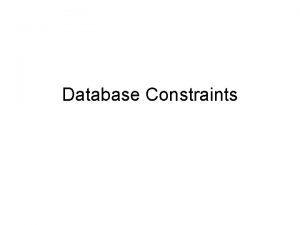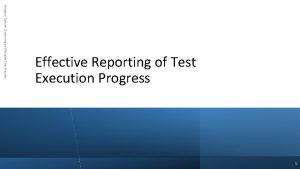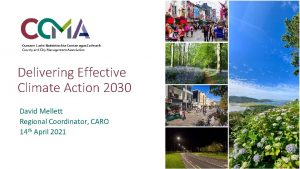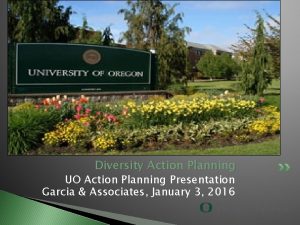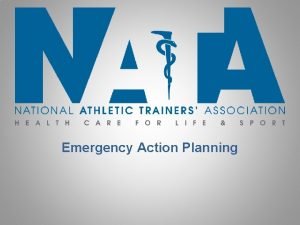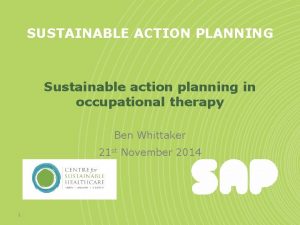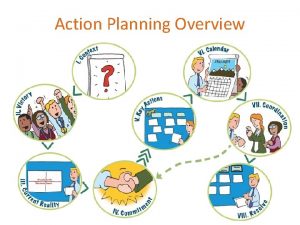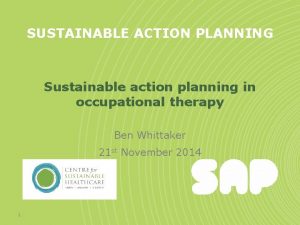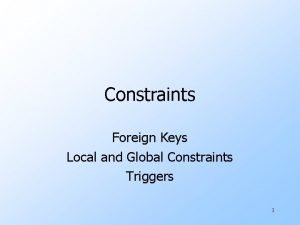Opportunities and constraints in delivering effective Action Planning


































- Slides: 34

Opportunities and constraints in delivering effective Action Planning: a UK perspective Workshop on Plans and Programmes of Air Quality and National Emission Ceilings Directives 1 st September 2004 Dr Nicky Woodfield Air Quality Management Resource Centre University of the West of England, Bristol, U. K. Air Quality Management Resource Centre, U. W. E. , Bristol, UK

The AQM Resource Centre University of the West of England, Bristol, UK • Manage UK local authority air quality review & assessment contract - Appraisal of air quality reports - Provision of web site & helpdesk facility • Official & non-official air quality guidance • Provide air quality training sessions & workshops • Develop air quality strategies, action plans & air quality policy • Undertake independent air quality research Air Quality Management Resource Centre, U. W. E. , Bristol, UK

UK Air Quality Management Process • Environment Act 1995 – Air Quality Strategy (1997, 2000) – Air Quality Regulations (2000) • Review and Assessment approach (Round 1) – Predict future concentrations, identify exceedences of air quality objectives – Focus on public exposure – Culminated in about 130 local authorities with AQMAs across the UK – Multi-disciplinary approach – Air quality action planning underway Air Quality Management Resource Centre, U. W. E. , Bristol, UK

UK Air Quality Management Process • Evaluation of Round 1 – Changes to assessment process: Updating and Screening Assessments (identify changes, new monitoring data) – Air quality assessment long-term timetable to 2010 – Streamlined approach to assessments & guidance – Updated tools and guidance available for Round 2 (checklists, new spreadsheet tools, new background maps) – Detailed Assessments – Annual Progress reports (monitoring data & new developments) Air Quality Management Resource Centre, U. W. E. , Bristol, UK

Air Quality Management Areas in UK • Currently 127 local authorities with AQMAs • Varied topographies: whole borough, isolated properties, road networks, road links • Revokations, amendments, new AQMAs declared: Pollutants • 95% Nitrogen dioxide • 45% Particulate matter PM 10 • 4% Sulphur dioxide AQMAs declared: Sources • 74% traffic only • 12% mainly traffic • 5% traffic & industrial • 4% industrial only • 1% domestic & traffic Air Quality Management Resource Centre, U. W. E. , Bristol, UK

UK Air Quality Management Process Air Quality Review & Assessment AQMA 12 months 18 months Consultation Stage 4 or further assessment Action Plan Air Quality Management Resource Centre, U. W. E. , Bristol, UK

Air Quality Action Planning requirements Environment Act 1995 requires local authorities with designated AQMAs … ‘ to prepare a written plan for the exercise by the authority, in pursuit of air quality standards and objectives in the designated area, of any powers exercisable by the authority. ’ Within guidance, the approach to evaluating options in the plans should contain … ‘evidence that all available options have been considered on the grounds of cost-effectiveness and feasibility’ Policy Guidance 2003 Air Quality Management Resource Centre, U. W. E. , Bristol, UK

Air Quality Action Planning (AQAP) • Action plans requires substantial transition (technical assessment to wider policy integration) • Corporate adoption of the AQAP is essential • Local Transport Plans (LTPs) – freedom to integrate Action Plans into LTP • Integration of wider Plans & Policies essential: – Local Plan – Economic Development/ Regeneration Plans – Sustainability Plans – Health Action Plans – Route Management Strategies (Highways Agency) Air Quality Management Resource Centre, U. W. E. , Bristol, UK

Air Quality Action Planning • Air quality improvement necessary (further assessment or Stage 4 provides technical backing to decisions) • Wider impacts (e. g. climate change, socioeconomic impacts, regeneration) need to be considered • Wider planning involvement, within and external to local authority • Cost-effectiveness of measures • Cross-boundary issues may be relevant Air Quality Management Resource Centre, U. W. E. , Bristol, UK

Action Planning framework Identify AQO exceedences declare AQMA Identify sources CONSIDER OPTIONS AQ improvements Cost effectiveness Non AQ impacts Practicability PRIORITISATION OF OPTIONS AIR QUALITY ACTION PLAN Implementation and monitoring Air Quality Management Resource Centre, U. W. E. , Bristol, UK

1. Identifying Sources • Source apportionment (Stage 4 or further assessment) • Often information most useful for an action plan relates to ‘type’ of sources: – Through-traffic – School traffic – Commuter, leisure traffic or tourist traffic Air Quality Management Resource Centre, U. W. E. , Bristol, UK

2. Consideration of options • Utilise existing or proposed options in other plans • Balance between what is already under discussion (and therefore realistically deliverable) and a new vision for the future • Options need to be drawn up in discussion with a variety of stakeholders • Knowledge of the locality and current actions imperative Air Quality Management Resource Centre, U. W. E. , Bristol, UK

3. Evaluation of options • Often not possible to include quantitative appraisal • Some quantitative appraisal of air quality impacts may be possible • Rating system is often useful (high/medium/low) • Some AQAPs just provide general statements of non-AQ impacts, perceptions, cost and feasibility Air Quality Management Resource Centre, U. W. E. , Bristol, UK

4. Prioritisation or Ranking options • Key challenge of the Action Planning process • Not an ‘either’ ‘or’ process • May wish to take a matrix approach in determining a prioritised list e. g. relative scoring or rating of options • Qualitative and quantitative approaches • Difficult to incorporate combinations of options • Need to take account of temporal aspects of options Air Quality Management Resource Centre, U. W. E. , Bristol, UK

Prioritisation: Qualitative example From NSCA Guidance ‘Air Quality: Planning for Action’ Air Quality Management Resource Centre, U. W. E. , Bristol, UK

Prioritisation: Semi-quantitative example From NSCA Guidance ‘Air Quality: Planning for Action’ Air Quality Management Resource Centre, U. W. E. , Bristol, UK

Evaluation: South Lakeland DC (England) Air Quality Management Resource Centre, U. W. E. , Bristol, UK

Evaluation & Prioritisation: Wycombe (England) From Wycombe District Council’s Air Quality Action Plan Air Quality Management Resource Centre, U. W. E. , Bristol, UK

Prioritisation: Blaby DC, England % improvement in air quality <0. 01% 0. 010. 1% 0. 1 -1% 1 -5% 5 -10% >10% <£ 0 £ 0 -£ 1000 - £ 10, 000 - £ 100, 000 -1 million -10 million >10 million From Blaby District Council’s Draft Air Quality Action Plan Air Quality Management Resource Centre, U. W. E. , Bristol, UK

Case Study 1: York, England • Consultation on Local Transport Plan 83% thought more action needed to reduce traffic congestion – ideas for necessary measures arose – starting point • 48 possible options were divided into three categories – Public transport and alternative transport measures – Traffic management and car parking measures – Planning and promotional measures • Initial (breakfast) workshop: participants considered options in terms of acceptability to themselves or their organisation • Evening workshops: participants prioritised 31 options remaining after the first workshop Air Quality Management Resource Centre, U. W. E. , Bristol, UK

Case Study 2: Gravesham, England • Gravesham have two separate AQMAs - 1 traffic, 1 industrial • A working group was set up as the most effective way forward to identify options • The options were chosen and then evaluated in terms of AQ impacts, non-AQ impacts, feasibility and cost • This evaluation was then used in a small workshop to prioritise the options for the draft Action Plan Air Quality Management Resource Centre, U. W. E. , Bristol, UK

Case Study 3: Bristol, England • 25% of city declared as AQMA • Development of Plan led by Transport Planners • Recognises LTP measures to improve air quality, and subsequent 27 ‘top up’ measures to ensure a more rapid improvement of air quality. • Screening assessment therefore identified: – NEW/LTP+ (new AQAP measure and ‘top up’ measure) – LTP (measure adequately covered in LTP) – N/A (measure not cost-effective as an air quality measure) Air Quality Management Resource Centre, U. W. E. , Bristol, UK

Case Study 4: West Wiltshire, England • Two separate AQMAs, mainly traffic related • Example of small rural borough with AQMAs relating to historic market town and small town centre • Consultation has included County Council, town council, members of the public • Options identified by Council in consultation with consultants, and through workshop events and seminars with consultees Air Quality Management Resource Centre, U. W. E. , Bristol, UK

Case Study 5: London Borough of Richmond • London-wide measures: – Encourage cleaner fuels & vehicles – Low Emission Zone for London • Borough-wide measures: – Minimise commuter parking – Reduce impact from council fleet – Encourage Travel Plans – Emissions testing • Local measures: – Improvements to roads and junctions – Pedestrianisation Air Quality Management Resource Centre, U. W. E. , Bristol, UK

Non-UK Case Study: Bangkok • Much greater issues in terms of AQ concentrations • Workshop approach to identify options • Some evaluation of AQ impacts, non-AQ impacts, cost and feasibility undertaken within the workshop • Similar techniques as York used in terms of prioritising options • Part of ongoing work to get an effective Action Plan in place for Bangkok Air Quality Management Resource Centre, U. W. E. , Bristol, UK

Bangkok measures identified and evaluated through workshop Air Quality Management Resource Centre, U. W. E. , Bristol, UK

Following on from Action Plan development • Implementation of Plan • Monitoring Action Plan effectiveness important in future Progress Reporting of Action Plan • Different indicators of success can be used (not necessarily only air quality) • Statutory duty to undertake Action Planning Progress Reports annually (may be linked with Local Transport Planning reviews) Air Quality Management Resource Centre, U. W. E. , Bristol, UK

Ideas for Indicators … • May be more effective to consider monitoring effectiveness of different measures in Plan: – Cycling facilities: increase in cycle trips – 20 mph zones: speed monitoring (% vehicles exceeding limits) – Car Clubs: number of new members – Travel Plans: emission reduction estimates from monitoring business mileage – Vehicle scrapage: number and types of replacement vehicles – Indication of air quality awareness through opinion polls – Reduction in car-parking space allocation in planning developments Air Quality Management Resource Centre, U. W. E. , Bristol, UK

Evaluation of Action Planning process • Evaluation undertaken by Casella Stanger and Transport Travel Research Ltd. on behalf of UK governments • Issues considered: – Links between the policy and technical aspects – Evidence of impact of action planning process on way in which local authorities work with external organisations – What does the consultation element of action planning deliver ? Air Quality Management Resource Centre, U. W. E. , Bristol, UK

How effective is the action planning process? • Evidence of the impacts of action planning on local air quality - what are the constraints? • Analysis of costs and impacts data • Constraints to the action planning process funding and responsibilities? • How could action plans be improved? • Evaluation of appraisal reports - is it useful? • Local Air Quality Strategies - what are the links with the action planning process? Air Quality Management Resource Centre, U. W. E. , Bristol, UK

Negative aspects to Action Planning (1) • Lack of resources a major constraint (staff & implementation of measures) • Difficult to engage with key stakeholders (Highways Agency, County Council or other internal department) • Measures not within local authority control • Timescale for implementing options long-term (requirement to meet objectives beyond the target date, and as such medium to long-term measures will still deliver improvements in future years) Air Quality Management Resource Centre, U. W. E. , Bristol, UK

Negative aspects to Action Planning (2) • Recent phasing of Action Planning process not aligned with Local Transport Planning processes - Impacts on bidding process and funds available - Difficulty in applying firm time scales for implementation • Difficulty in quantifying improvements in air quality resulting from Action Plan implementation • Difficult to determine whether air quality objectives will be delivered Air Quality Management Resource Centre, U. W. E. , Bristol, UK

Positive aspects to Action Planning • Increased liaison with neighbouring local authorities, external organisations & agencies – development of working groups to tackle problems (and wider environmental issues) • Better working relationships within local authority • Raised status of air quality on political agenda • Provide new stream of funding for some transport initiatives • Influence Local Transport Planning processes • Increasing number of Air Quality Strategies highlighting more strategical approach to managing air quality Air Quality Management Resource Centre, U. W. E. , Bristol, UK

Action Planning information & guidance UK Government Policy Guidance (PG(03)) www. defra. gov. uk/environment/airquality/ UK Action Plan Helpdesk www. stanger. co. uk/actionplan NSCA Air Quality Action Planning Guidance www. nsca. org. uk AQM Centre, U. W. E. , Bristol, UK www. uwe. ac. uk/aqm/centre Air Quality Management Resource Centre, U. W. E. , Bristol, UK
 Supplemental merchandising copy
Supplemental merchandising copy Designing and delivering oral and online presentations
Designing and delivering oral and online presentations Customer satisfaction value and retention
Customer satisfaction value and retention Organizing and delivering a manuscript speech
Organizing and delivering a manuscript speech Outline for entertainment speech
Outline for entertainment speech Preparing effective business message
Preparing effective business message Principles of effective planning
Principles of effective planning Marriages and families 8th edition
Marriages and families 8th edition Marriages and families changes choices and constraints
Marriages and families changes choices and constraints 6 step protocol for delivering bad news
6 step protocol for delivering bad news Who is the father of renaissance art?
Who is the father of renaissance art? Delivery of services through intermediaries
Delivery of services through intermediaries Delivering dental care chapter 33
Delivering dental care chapter 33 Channel levels in marketing
Channel levels in marketing Nine key strategic steps to produce defect free software
Nine key strategic steps to produce defect free software Delivering business value with it at hefty hardware
Delivering business value with it at hefty hardware Health and wellbeing 2026
Health and wellbeing 2026 What divides the nasal cavity
What divides the nasal cavity Marketing channel objectives
Marketing channel objectives Marketing channels delivering customer value
Marketing channels delivering customer value Delivering quality service
Delivering quality service Delivering business value
Delivering business value French and indian war
French and indian war Terry schuster
Terry schuster Delivering services through intermediaries
Delivering services through intermediaries Extemporaneous speech
Extemporaneous speech Delivering lines based loosely on the written
Delivering lines based loosely on the written Sarah is delivering a presentation on the solar system
Sarah is delivering a presentation on the solar system Multi channel distribution
Multi channel distribution Delivering the nuclear promise
Delivering the nuclear promise Delivering the future
Delivering the future Goal setting and action planning chart example
Goal setting and action planning chart example Inactivism planning
Inactivism planning Short medium and long term planning in education
Short medium and long term planning in education Language planning ppt
Language planning ppt
